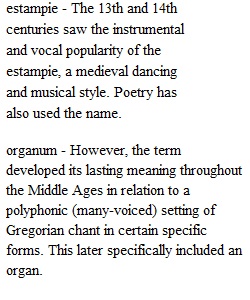


Q Study Guide — Middle Ages, Renaissance, and Baroque l . Terms: estampie organum a cappella mass motet affections terraced dynamics basso continuo movement pedal point prelude libretto aria recitative duet overture castrati basso ostinato oratorio 2. The most important musicians during the Middle Ages were 3. The most educated during the Middle Ages were 4. Important Middle Age female composer 5. Was medieval music primarily vocal or instrumental 6. What is Gregorian chant 7. Does Gregorian chant move in stepwise motion or large leaps 8. Wandering minstrels performed on what instruments 9. Well known female troubadour 10. Development of polyphony 1 1. Leonin and Perotin 12. Guillaume de Machaut 13. Know the parts to the mass ordinary 14. During the Renaissance educated people were expected to 15. Thomas Weelkes 16. During the Renaissance, instrumental music was intended for 17, A lute is 18. George F. Handel 19. Johann S. Bach 20. Primary keyboard instrument of the baroque period 21. Know baroque orchestra 22. What was the role of the baroque music director 23. What was the position of the baroque composer 24. Concerto grosso 25. Fugue 26. Opera 27. The goals of the Camerata were 28. Claudio Monteverdi 29. Henry Purcell 30. Baroque sonata 31. Baroque trio sonata 32. Antonio Vivaldi composed what 33. Dance suite or baroque suite 34. Chorale prelude 35. George F. Handel and the Messiah
View Related Questions